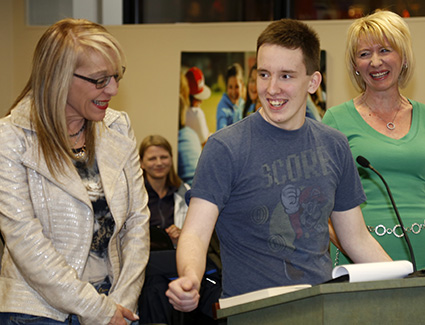
High school can be a challenging environment for any student as they balance their academic and social experience and engage with others as part of high school life.
Learning how to strike that balance can sometimes be a greater challenge for students with a diagnosis of high-functioning autism or Asperger’s syndrome, but the Autism and Asperger’s Resource Program at Marion M. Graham Collegiate works with students in a variety of innovative ways to help them succeed both academically and socially.
Learning co-ordinator Coreen Dutka says the program’s creation 10 years ago was a direct response to the needs of students with a unique set of circumstances. When the program was launched it included five students at Evan Hardy Collegiate but has since grown to 38 students at both Evan Hardy and Marion M. Graham.
“These young people had average to above-average cognition; they were able to take regular classes and perform quite well in classes,” Dutka explains. “But what the disorder really brings with it is that these students struggle socially; they have some sensory management issues in terms of noise, light, anxiety, those kind of things that go along with a lot of senses being stimulated all at once, and along with that (there are) self-regulation issues.
“The kinds of things you may find in students who struggle with Asperger’s and high-functioning autism is they may have some trouble with social interaction – reading body posture, facial expression, maintaining eye-to-eye gaze – and, in a classroom setting, being able to socially and appropriately interact with people.”
One of the innovative aspects to the Marion M. Graham program is the inclusion of vigorous physical activity as a means to self-regulation, something which is proving very effective for many students. The students participate in physical activity at regular intervals and are experiencing a variety of benefits. In practice, this equates to approximately 15 minutes of physical activity per Resource class.
Dutka stresses the importance of students being aware of how they are feeling and where they are on a five-point regulation scale. The time spent on physical activity allows students to elevate their heart rate and can help to kick-start the self-regulation process before they return to their studies. In addition, she has observed increased wellness and social growth among the students.
“There is definitely a decrease in anxiety in the students who are able to maintain that exercise program. We see that in their ability to come back to class and identify what their priority work task is,” she says. “I notice that there is increased socialization with attendance in the weight room because students are down there talking with each other, high-fiving each other and giving each other kudos.”
Taylor Brakefield entered the program when he started Grade 9 at Evan Hardy Collegiate. He has continued in it since moving to Marion M. Graham, where he takes advantage of the weights and cardio machines during the class time dedicated physical activity. He says the Autism and Asperger’s Resource Program helped with his initial transition to high school and has been a valuable support in the years since.
“I know when I graduated from Forest Grove I was pretty scared of high school; scared of not making friends and of the assignments,” says Taylor. “But when I went to Ms. Dutka’s Resource room program at Evan Hardy it felt really easy for me to make friends and I got a lot of work done in the Resource room. It really lowered my anxiety level and made me feel calm and wanted in that room.
“Whether you go to the Resource room to finish assignments or study for tests it’s just a great place to work. I really love the people there and made a lot of friends over the years. Hopefully in the future I can look back and realize that I did a great job and we really made the right decision.”
Taylor’s mother, Leslie, said the program has had a profound effect on her son both in and out of the classroom by providing him with ability to be independent and to be confident in both himself and his surroundings. She believes the biggest benefit for Taylor has been learning to identify how he is feeling – something she says can be very difficult for kids with autism – and then having strategies to deal with those feelings.
“What I love about this program is it is a very safe environment for him, a very understanding environment for him, but it is an environment that challenges him in many ways,” she said.
“One of the things I really liked most when they started with self-regulation at Evan Hardy, when Taylor was in Grade 9, was it wasn’t just about regulating their bodies and their emotions and their anxiety --they also used it as a learning opportunity for social skills. If there was something going on in the classroom they had a fun, stress-less environment to discuss those kind of things and to use those kind of opportunities as teaching moments. There are so many teaching moments through the day and to have people who understand these kids and understand how they learn and use those opportunities to teach them is just invaluable.”